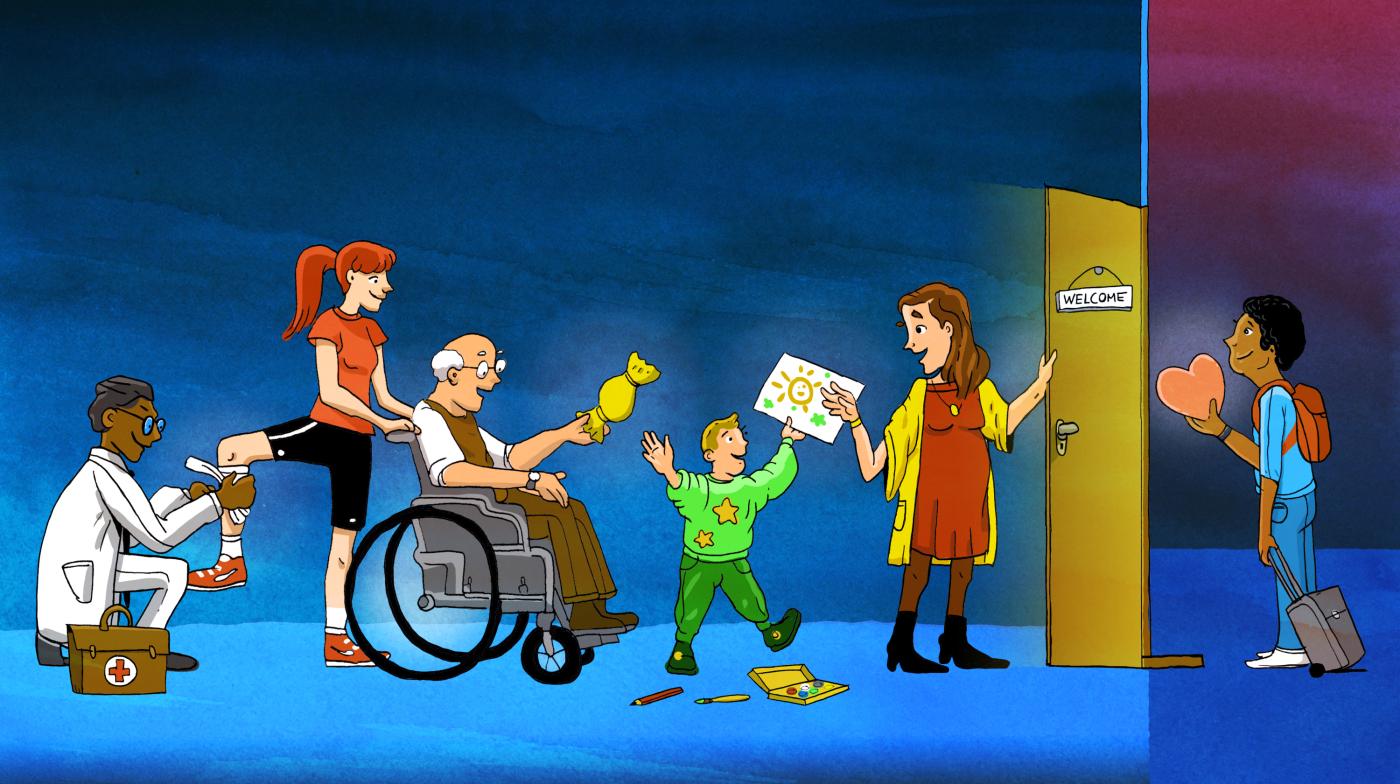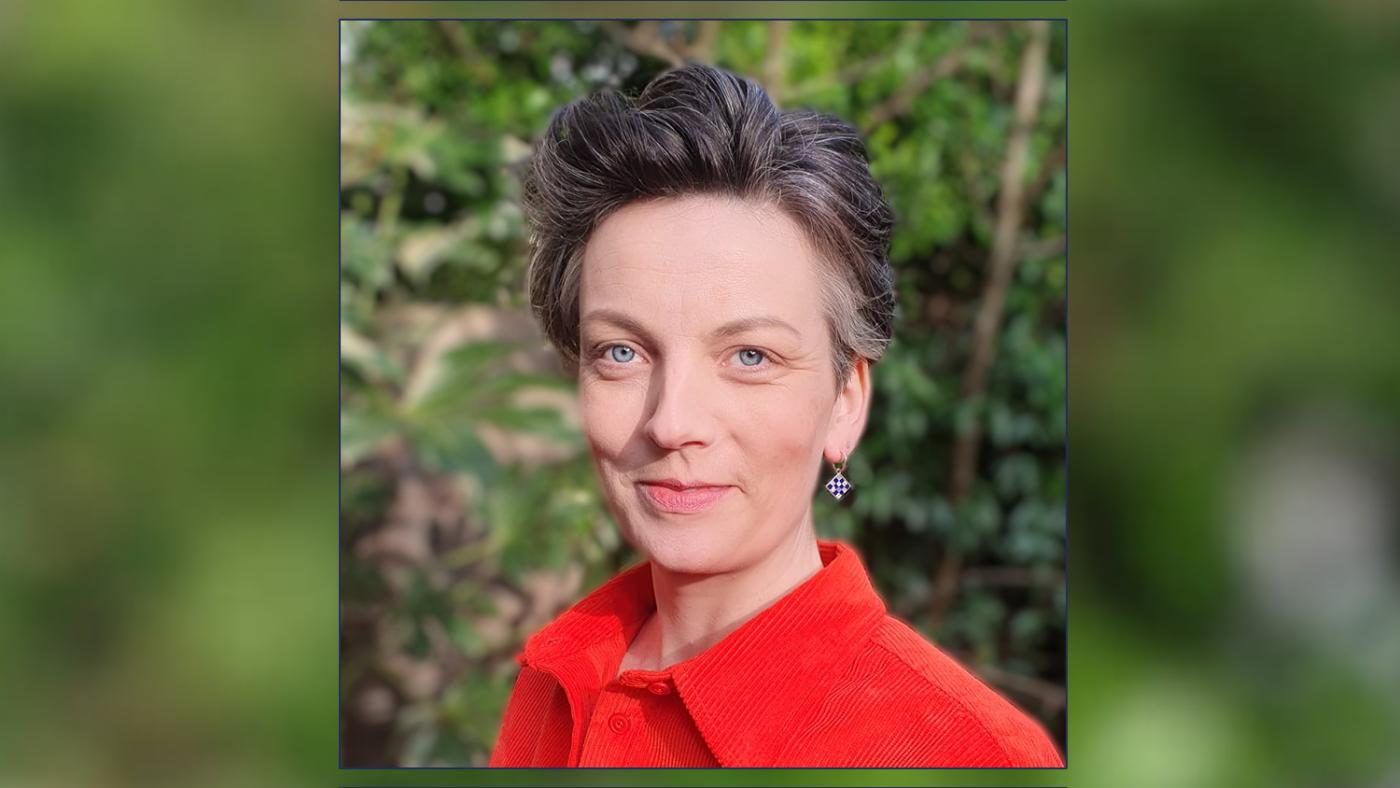Scientists talk politics, part 2: sociologist Marguerite van den Berg
'Everyone needs protection, love and care'

Marguerite van den Berg, Associate Professor at the Department of Public Administration and Organisational Science, already had some notes for a book about vulnerability lying on her desk when the subject suddenly became personal. One Monday afternoon, just over a year ago, she woke up with a five-hour gap in her memory and her face was swollen and bruised. The doctor qualified what happened to her as a “collapse”. She calls it “a confrontation with my own vulnerability”.
She needed months to recover, which gave her enough time to reflect on vulnerability, a theme often present in her earlier work. In the first few months, all she could do was write down loose notes in a notebook, as she was unable to sit at the computer just yet. These notes resulted in the book Kwetsbaar. Politieke mogelijkheden (Vulnerable. Political Possibilities, Ed.), which was published in September 2025.
In this essayistic work, Van den Berg argues that we should not see our vulnerability as a problem, but rather as a prerequisite for living together – an idea that is rarely reflected in Dutch politics. To make this point, Van den Berg draws on her own experiences and a wide range of sources, including non-academic ones such as Nina Simone and Virginia Woolf.
“We can't do it alone”
“I wanted to make the reader feel something with this book. Art can help with that,” she explains on a video call. DUB spoke with her about her book and the upcoming elections.
Van den Berg says that the collapse was not the first time she became aware of her own vulnerability, but it did force her to face the facts. "Once again, I was confronted with the fact that my body is largely made of soft matter and can therefore break down just like that. In times like that, you need help from others, such as the help I got from my GP that day."
The same applies to all of us, obviously. "Whatever your situation, everyone has a body and therefore needs protection, love and care. We cannot do it alone," she says.
According to Van den Berg, this is where the political possibilities of vulnerability lie. "If we recognise that we all have vulnerable bodies, we can build something together to take care of them. For example, we build sewers together so that no one gets cholera. Solidarity is, in fact, collective self-protection."
“We now live in the leaking ruins of the welfare state”
According to Van den Berg, the Dutch welfare state, with its public healthcare and benefits, is a concrete example of what such solidarity can achieve. However, less and less remains of what was once an impressive “structure of solidarity”. She observes that "we have long since stopped maintaining the welfare state and now live in its leaking ruins."
An example: when Minister Marga Klompé introduced the General Assistance Act in 1965, her aim was to ensure that Dutch people who found themselves in financial difficulties no longer had to feel ashamed – after all, it could happen to anyone. "Little remains of that now" sighs Van den Berg. "Social assistance is no longer enough to live on, and the shame of poverty is back in full force."
The norm these days is "every man for himself". According to Van den Berg, both politicians and citizens now tend to think in terms of "the autonomous individual”. However, she argues that self-reliance is a fiction. "I am convinced that the people who shout the loudest that they are self-reliant are the ones who receive the most help. They have their mortgage interest deduction, insurance, maybe even a cleaner."

Marguerite van den Berg. Photo: Willem Schinkel
“The people who shout the loudest that they are self-reliant receive the most help.”
Politicians and the media often talk about a “divide” between rich and poor, those with a migrant background and those without, the low-skilled and the highly skilled – in short, between the vulnerable and the non-vulnerable. According to Van den Berg, this doesn't help. "People who talk about a 'divide' usually think they are on the right side. They assume too great a difference between themselves and the 'vulnerable' people. Those people are not fundamentally 'different' from us, but have been made vulnerable by the system in which we live."
She does not think there are sinister intentions behind this mentality, but it does stand in the way of genuine solidarity. Encouraging people to engage in “collective self-protection” is difficult if they feel that there is a divide running through that collective. "In the best-case scenario, such thinking leads people to adopt a paternalistic attitude towards the 'vulnerable': they start to take care of them. In the worst-case scenario, the vulnerable are seen as weaklings."
“Violence that you use against others will ultimately come back to you”
However, awareness of our own vulnerability does not automatically lead to solidarity, as Van den Berg emphasises. Those who respond solely out of fear often resort to violence. "You can see this in the way Israel treats the Palestinians, or how Europe treats migrants," she says. "They build a fortress, with so-called security on one side of the walls and poverty, violence and oppression on the other."
However, in her view, that is but the illusion of security. "The violence you use against others will ultimately come back to you, as painfully evidenced on October 7, 2023, when Hamas attacked Israelis. You cannot live in safety next to an open-air prison like Gaza," she says. In addition, she believes that this defensive attitude is simply harmful to society. "Those who are only concerned with defending the fortress are left with ruins on the inside. We are busy patrolling the edges of Europe, all the while neglecting our welfare state. We want to protect our solidarity against outsiders, but this urge is precisely what is eroding it from within."
"We must take action, now more than ever"
The current political debate in the Netherlands, in which refugees and asylum seekers regularly play a bitter leading role, offers little hope, but Van den Berg thinks we should not fixate on that. "Fortunately, what happens in the House of Representatives is not the only thing that matters in a democracy," she observes. "Arguing rarely leads to change."
Taking to the streets, striking, volunteering and uniting with other citizens are more likely to lead to change, Van den Berg argues. After all, the seeds of the Dutch welfare state were not planted by politicians, but rather by labour movements. "That's why we need to take action, especially now," she says. "The criminalisation of illegality is a good example: you can post your opinion on social media and wait for politicians to change something, but you can also protest and prepare meals for undocumented migrants."
Nevertheless, Van den Berg will vote on October 29. "Although we should not exaggerate the importance of debate, it remains important that certain things can be said in the House of Commons," she says. But that does not mean that people will have fulfilled their democratic duties after that day. "It's genuinely lazy to think that all you have to do is vote for someone and this person will then take care of things for you. That's not how it works. We must continue to search for other forms of solidarity."
Scientists talk politics
In the run-up to the Dutch elections, DUB spoke with three researchers about the link between their research and politics.
- Urban planner Maarten Hajer on climate policy: “We can only save climate policy with more imagination”
- Criminal lawyer Joep Lindeman on “criminal” politics
- Sociologist Marguerite van den Berg on vulnerability in politics
Comments
We appreciate relevant and respectful responses. Responding to DUB can be done by logging into the site. You can do so by creating a DUB account or by using your Solis ID. Comments that do not comply with our game rules will be deleted. Please read our response policy before responding.